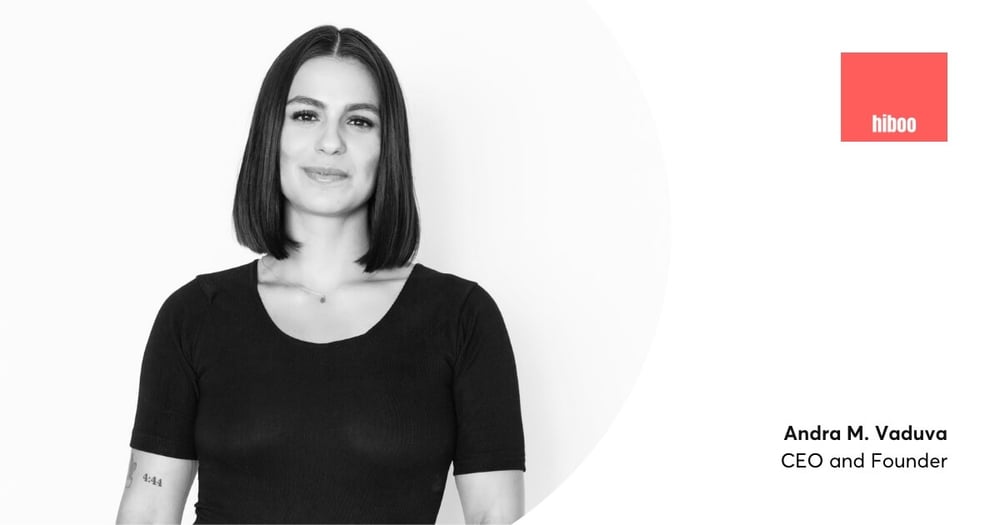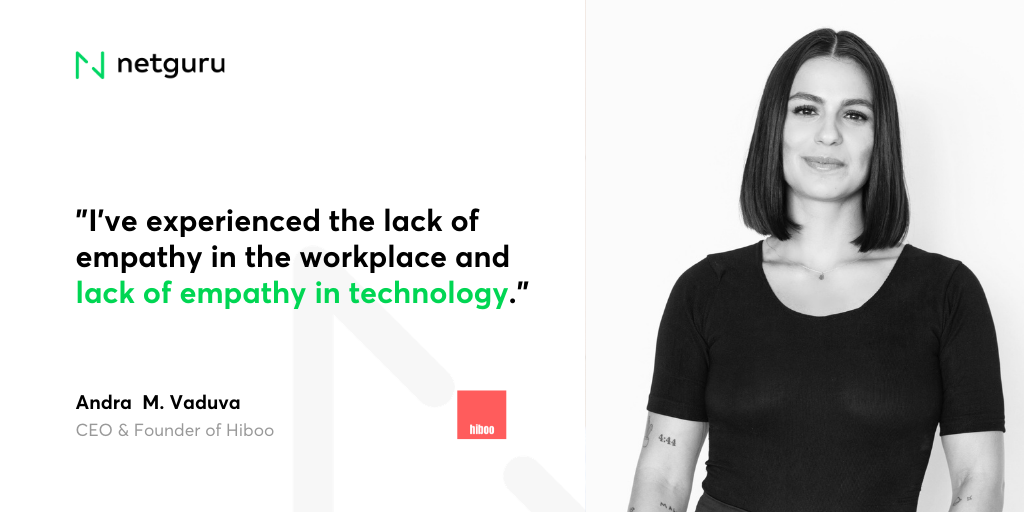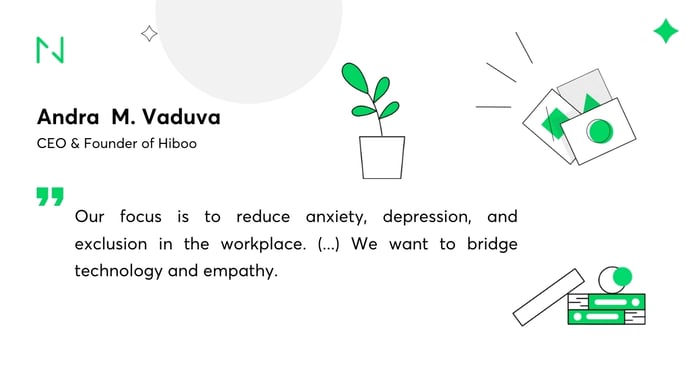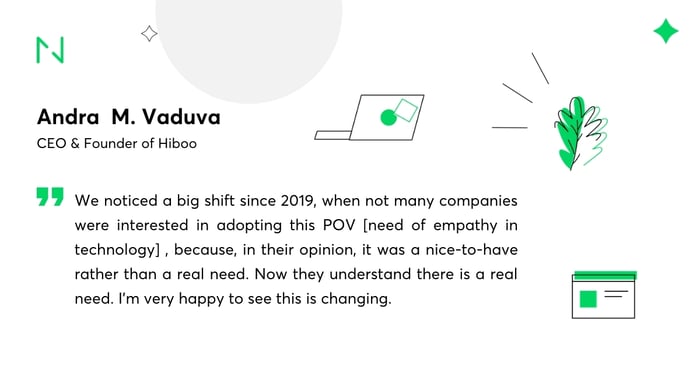How Can AI Solutions Make Workplaces and Technology More People-oriented?

Thirty-seven percent of respondents of a study by Pew Research Center indicated that by 2030 most individuals will be worse off because of AI advancements.
Respondents were also worried that individuals could experience a loss of control over their lives, or a reduction in cognitive, social and survival skills due to the popularization of AI-based solutions.
But these are just thoughts and opinions about AI. Some of them might be right, others might be wrong.
On a different note, many of us think that AI can actually make the workplace, especially in highly digitized industries, more human. This is the mission of Hiboo, an emotional AI engine that solves work-related challenges and helps grow your career with tactical and strategic information.
We met with Andra Vaduva, Hiboo’s CEO and Founder, to discuss the origins of her company, learn how Hiboo reduces exclusion, anxiety, and depression in the workplace, and ask what she thought about the post-pandemic reality we will all be experiencing soon.
Dominika Błaszak, Netguru: About ten years ago, you moved to the US from Romania. Did you think about creating your own company back then?
Andra M. Vaduva, Hiboo: I got a scholarship for my master’s. I moved to the US to go to grad school in mass communication and statistics, and while I was there I also got a certificate in entrepreneurship and business from the same university.
I guess I started planting the seeds there. I worked with entrepreneurs through my program, but I've always been interested in starting my own company because my parents are entrepreneurs themselves and I just grew in a family with this kind of dynamic.
It went full circle when I moved to the United States. I was always very interested in improving women’s lives and, even more so, the workplace. Women have a different attachment to the workplace than men.
I know from my own experience how challenging it is for women and minorities to build a career without access to the right resources. This is a question that kept me up at night: How can I create a better work environment and empower all women and minorities to have a voice in the boardroom and to give them the right resources to build the career of their dreams?
How did you come up with an idea of using AI to boost empathy?
I started working with tech startups in New York as soon as I graduated. I was active in this environment of data-driven companies and AI-based solutions and focused on the mission of helping and empowering women.
I've learned a ton by working with startups when I was responsible for growth and product marketing. Thanks to these experiences, I grew a love for tech products and I realized that technology can make our world better and empower us if we build with humans in mind.

I arrived at the idea of Hiboo in 2018. I've gone through my challenges at work in a fast-paced environment. So I started thinking how I can bridge technology, AI, and empathy. I've seen the lack of empathy in the workplace and technology. So I really went on this journey of understanding and learning what's needed to create empathy-driven technology.
Could you tell us where the name of the company comes from?
I love this question, so thank you for asking it. It comes from the French word ‘hibou’ which means ‘owl’. Owls are quite unique birds, Picasso dedicated part of his art to owls. They can see things from above and manage multiple challenges at the same time.
I arrived at this name through my spiritual journey that started in 2018 .
You describe Hiboo as an empathy-driven solution for the workplace that reduces exclusion and anxiety by solving work-related challenges and growing your career with tactical and strategic information. How does this solution do it?
I envisioned an algorithm that changes your mood through content. I wanted to test the hypotheses of “Can we truly humanize technology?”, and “Can we make technology more “emotional” and build empathy at the same time?” Subsequently, we did research on whether potential users would use a product like this.
We realized that this type of solution works best in the workplace, especially taking into consideration the trends in remote work and future of work. Our journey has been organic and a true learning experience. I can say we have developed a unique proprietary solution to solve challenges in the workplace. And we couldn’t be more excited.

At the beginning of this year, we decided to build a solution that addresses anxiety and depression related to the feeling of exclusion and powerlessness at work. We want to bridge technology with empathy. There are many modalities to leverage AI - text, voice, facial recognition. It’s such an appropriate time to turn technology into an ally.
We’re talking about boosting empathy, but maybe we should also understand what this term means to you?
In relation to Hiboo it’s about implementing empathy in technology and designing conversations with empathy in mind. Human-centered technology really means understanding what the humans’ needs are, starting with them in mind, and building solutions based on their feedback while leveraging AI.
Is the so-called ‘new normal’ a challenge or an opportunity?
The world we used to know has changed forever and, in many cases, the changes have been positive. I'm an optimist. With the Black Lives Matter movement, a ton of companies have taken positions and they're making changes within their culture, both externally and internally. This is very important, because not only are they coming up with resources to help their consumers, but are also changing the culture from within

We see a tremendous change in budget allocations and focus. We're in talks with many companies to partner up in this effort to bring more empathy into the world and into technology.
We noticed a big shift since 2019, when not many companies were interested in adopting this POV because, in their opinion, it was a nice-to-have rather than a real need. Now they understand there is a real need. I'm very happy to see this is changing. I’m also glad to see a lot of openness from leaders to discuss, share, and help, which I didn't necessarily see before.
What is your biggest challenge right now?
I think the biggest challenge is to find the right partners to further the message. We are a self-funded startup and we want to keep it this way until we reach our internal goals. For now, we are focused on building value without being forced into irrational hyper-growth. We want to build something for the future, so we need to be smart about it.
When do you want to launch your MVP?
The next few months are key for us, as we are adapting to the needs of a very volatile market.









